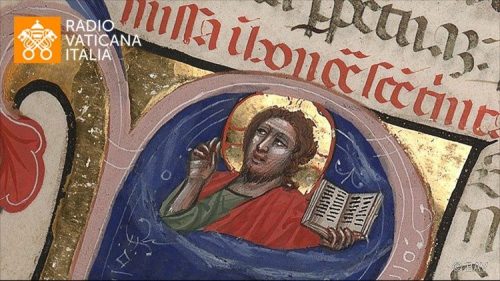READING OF THE DAY
TI 2:1-8, 11-14
Beloved:
You must say what is consistent with sound doctrine,
namely, that older men should be temperate, dignified,
self-controlled, sound in faith, love, and endurance.
Similarly, older women should be reverent in their behavior,
not slanderers, not addicted to drink,
teaching what is good, so that they may train younger women
to love their husbands and children,
to be self-controlled, chaste, good homemakers,
under the control of their husbands,
so that the word of God may not be discredited.
Urge the younger men, similarly, to control themselves,
showing yourself as a model of good deeds in every respect,
with integrity in your teaching, dignity, and sound speech
that cannot be criticized,
so that the opponent will be put to shame
without anything bad to say about us.
For the grace of God has appeared, saving all
and training us to reject godless ways and worldly desires
and to live temperately, justly, and devoutly in this age,
as we await the blessed hope,
the appearance of the glory of the great God
and of our savior Jesus Christ,
who gave himself for us to deliver us from all lawlessness
and to cleanse for himself a people as his own,
eager to do what is good.
GOSPEL OF THE DAY
LK 17:7-10
Jesus said to the Apostles:
“Who among you would say to your servant
who has just come in from plowing or tending sheep in the field,
‘Come here immediately and take your place at table’?
Would he not rather say to him,
‘Prepare something for me to eat.
Put on your apron and wait on me while I eat and drink.
You may eat and drink when I am finished’?
Is he grateful to that servant because he did what was commanded?
So should it be with you.
When you have done all you have been commanded, say,
‘We are unprofitable servants;
we have done what we were obliged to do.'”
WORDS OF THE HOLY FATHER
I am a servant, yet I am free; I am a son or a daughter, not a slave. This aspect of the Christian identity was the focus of Pope Francis’ homily […] for Mass at the Casa Santa Marta. The Pope based his reflection on the passage from the day’s Gospel reading (Lk 17:7-10), in which Jesus tells the Apostles to say: “We are unworthy servants”.
The Pontiff explained the meaning of this expression by turning to the Collect prayer for the day, during which “we prayed, asking for three graces”, namely: “Lord, graciously keep from us every obstacle, so that, in serenity of body and spirit alike, we may pursue in freedom of heart the things that are yours” (cf. Collect). This prayer summarizes the steps necessary in order to enter into a true dimension of service: that is, of being “unworthy servants”.
“The first thing that we asked is that the Lord keeps obstacles from us, in order to serve him well, to serve him freely, like sons and daughters”, the Pope said. Among the obstacles which the Christian faces on his journey, and which “prevent him or her from becoming servants”, we should remember at least two. One, of course, is “the desire for power”. It is a common difficulty which is frequently encountered in daily life: for instance, Francis said, how often, “perhaps in our home”, is it said: “Here I am in charge!”, or how often, “without saying it”, have we ensured that others were aware of our “desire for power”? In contrast, Jesus “taught us that the leader becomes as one who serves”, and that “if any one would be first, he must be servant of all”. Thus, Jesus “overturns the values of worldliness, of the world”. This is because the desire for power “is not the way of becoming a servant of the Lord. On the contrary: it is an obstacle, one of those obstacles which we prayed that the Lord might keep us from”.
There is, moreover, another obstacle, which can be observed “even in the life of the Church”, which is “disloyalty”. We encounter it “when someone wishes to serve the Lord, but also serves things which are not the Lord”. The Pontiff noted how “Jesus told us that no one can have two masters; serve God or serve money”. And disloyalty, he stressed, “is not the same as being a sinner”. Indeed, “we are all sinners, and we feel sorry because of this”. However, being disloyal is “like double-crossing”. And this “is an obstacle”. Therefore, “those who want power and those who are disloyal, can hardly serve, become a free servant of the Lord”.
Continuing along this line of meditation, the Pope went on to reflect on the second half of the day’s Collect prayer. After having asked the Lord to keep away obstacles, the prayer continues: “… in order that – the second question – in the serenity of body and spirit”, we might dedicate ourselves to service. The second key word therefore, is “serenity”, he said, that is: “serving the Lord in peace”. As Francis explained it: “obstacles – either the desire for power, or disloyalty – take away peace, and cause a yearning of the heart which cannot be in peace, which is always anxious, evil… without peace”.
It is a dissatisfaction “which leads us to live in that tension of worldly vanity, to live for appearances”. One sees many people who “live only to be in a shop window, for appearances, in order to say: ‘Ah, what a good thing it is…’, for fame, worldly fame”. Doing this, however, “you cannot serve the Lord”. That is why “we ask the Lord to remove obstacles because in serenity, be it in body or spirit”, we can “dedicate ourselves freely to his service”.
The Pope turned then to the third key word, which is “freedom”. Serving God “is free: we are sons and daughters, not slaves. To serve God in peace – with serenity, when he has removed from us the obstacles that rid us of peace and serenity – is serving him with freedom”. It is no coincidence, he added, that “when we serve the Lord freely, we feel an ever more profound peace”. It is like hearing once again the Lord say: “Come, come, come, good and faithful servant!”.
In order to do this, however, “we need his grace: by ourselves, we are unable”. However, the Pontiff explained, this does not mean that, “when we arrive at this state of free service, of sons and daughters, with the father, we can say: ‘we are good servants of the Lord’”. Above all, we are “unworthy servants”. This expression demonstrates “the unworthiness of our work: by ourselves, we are unable” to accomplish it. We must simply “ask and make space” in order that God “may transform us into liberated servants, into sons and daughters, [who are] not slaves”.
Francis concluded his homily with this prayer: May the Lord “help us open our hearts and leave the Holy Spirit to carry out his work, in order that he may remove obstacles from us, especially the desire for power which causes great pain, and disloyalty, [being] two-faced”; and that “he may give us this serenity, this peace to be able to serve him as free sons and daughters until the end, with great love”, saying to the Lord: “Father, thank you, but you know: I am an unworthy servant”.
(Santa Marta, 8 November 2016)

